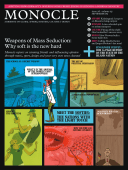
Issue 26
Monocle reports on winning friends and influencing opinion through music, sport, design and your very own news channel.
In This Issue
Oops! No content was found.
Looks like we no longer have content for the page you're on. Perhaps try a search?
Return Home

